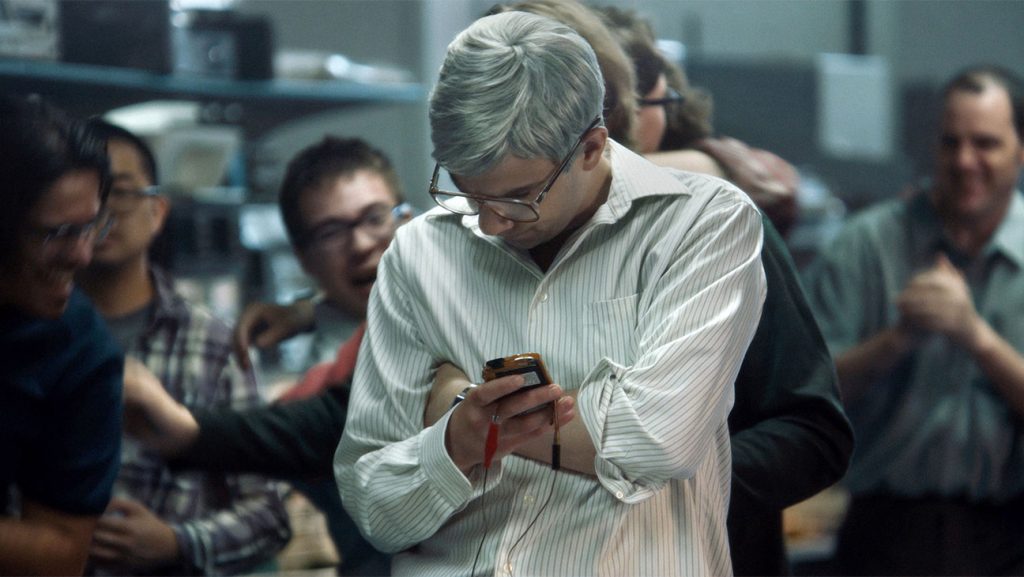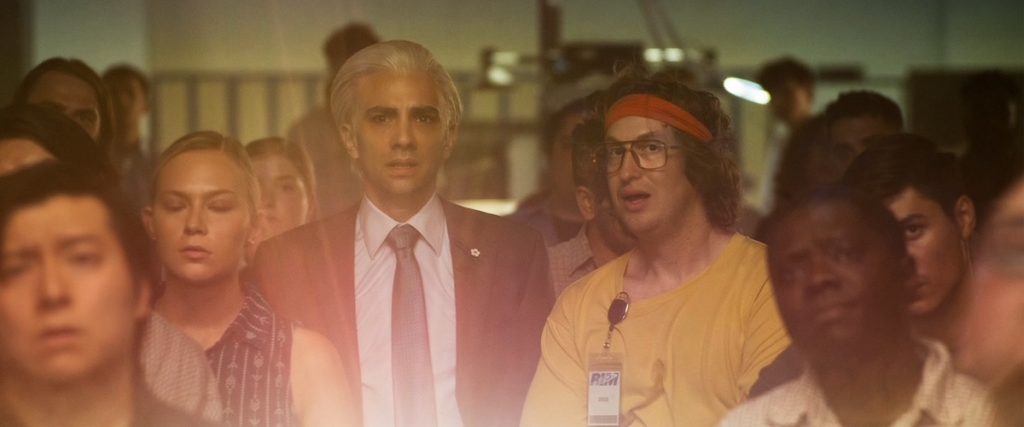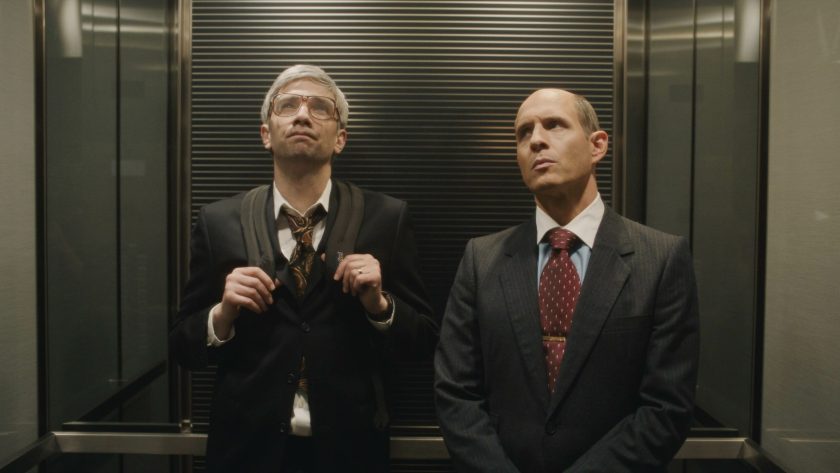The FilmSoc Journal is back for the 73rd edition of Berlinale, with critic Aryan Tauqeer delivering a look at the hits and misses of the upcoming 2023-4 season of cinema.
Aryan Tauqeer reviews Matt Johnson’s BlackBerry, a ruthlessly irreverent biopic of the swift rise and spectacular demise of what was once one of the most powerful corporations on the planet.
At the centre of Matt Johnson’s long-awaited followup to Operation Avalanche is a shiny, gleaming surface- one that often acts as the sole form of light illuminating both drab corporate boardrooms and the way forward for a sinking ship of a company. It often casts a spectre over the film’s proceedings, which draw heavily (as any chronicle of a tech corporation’s rise and fall would) from The Social Network but, in spite of the score that clearly (and unsuccessfully) pastiches that which Trent Reznor and Atticus Ross composed for Fincher’s film, the tonal variation of the film is grounded less in the biopics of Great Men than it is in Johnson’s own background in comedic irreverence. In both Operation Avalanche and his sketch Live at Comic Con (2013), Johnson applied the calculatedly dense overtures of the mockumentary to two of America’s most venerated mythologies- the Space Race and the Superhero Industrial Complex. The post-Y2K mythological manifestation American Dream, then, is not the glory of mass-produced automobiles or visions of endless corn pastures, both of which are industries where American narcissism has been displaced by the cold, hard realities of a globalized economy. Instead, this guiding myth takes the form of the tech start-up, romanticized as the blooming of human potential from the humble confines of suburban garages, where someday an industrious, committed young man might one day actualize his dreams of venturing into the great unknown of the cosmos. Of course, as Johnson’s latest film BlackBerry so acutely demonstrates, there are scarcely as many actualizations of these arrogant but well-intended gropes towards the stars as there are examples of the vessels for said conquests erupting in a fountain of flames on the launchpad.

The gleaming surface at the centre of BlackBerry’s chronicling of the rise and fall of the company that self-imploded shortly after the announcement of the iPhone, therefore, is not the screen of the titular cellular device. It is the conspicuously bald head of Glenn Howerton’s rendition of one of the company’s founders, Jim Balsillie, that propels the company beyond a proprietor of neat knick-knacks into a name synonymous with 21st-century communication technologies, and which ultimately transforms it into an artefact of the past. At least at first glance, Howerton’s performance is perhaps loaded with the weight of his onscreen presence- here, as in It’s Always Sunny in Philadelphia, he imbues a laughably unexceptional figure- in less delicate terms, a total loser- with a rather terrifying vitality that magnifies his shapeless silhouette into a godlike being, who exerts such precise control over every movement he enacts and is privy to, down to his face, that after a certain period of time, it becomes difficult to believe that he hasn’t skinned and worn someone else’s face. As the size of the titular company grows, so does Balsillie’s degree of influence over the proceedings of other people’s lives, at which point his role becomes less that of a firm corporate hand on the bespectacled nerds responsible for developing the device, Mike Lazaridis (Jay Baruchel) and Douglas Fregin (Matt Johnson), than it does a fascistic bellow echoing through BlackBerry’s offices, reminiscent at times of Alec Baldwin’s similarly transcendent performance as a trash-talking gammon-faced Bostonian cop in The Departed.
What separates Howerton’s performance from a mere archetype of sociopathy, however, is the manner in which it is situated within the network of character actors who occupy BlackBerry. Whilst Baruchel and Johnson certainly relish in renditions of gadgeteers that initially border on SNL-level parody, they increasingly occupy positions of genuine vulnerability (in both financial and emotional terms) as the meteoric rise of their self-founded endeavour grows into a behemoth whose reach is far beyond their comprehension. Their characters, as with Howerton’s, are as much conscious performers as the actors occupying their roles- they traffic in performative roles as much as they do in mobile phones, adopting and discarding various archetypes as the spectre that is Balsillie looms ever larger over them. A particularly telling instance of conscious performativity arrives early on, as Balsillie markets the nascent form of the BlackBerry, for the first time, to a stone-faced boardroom of investors. Up until this point, Balsillie’s façade of a steel-jawed businessman has scarcely been disrupted- despite the fact that his introduction in the film is marked by him getting fired after taking the reins over a product pitch of his own accord (an ominous sign of things to come), we scarcely doubt that his abandonment of virtually any form of corporate or personal ethics will singlehandedly propel the company into legitimacy- a feat that, on Howerton’s part, becomes doubly impressive when one considers that the audience is perpetually aware of the company’s premature demise. In the film, the first time the product reaches an audience with the means to render it a serious proposition is also the first time Balsillie’s affable temperament as well-intending conman is pierced- like a particularly unwieldy hot air balloon, Balsillie deflates as the board poses questions that go beyond requiring persuasion into requiring concrete, technical knowledge of what the product is capable. It is here, at the first undoing of a mask, that another one is created, in the form of Lazaridis asserting the archetype of the inventor, describing in pinpoint detail the entirety of what the BlackBerry can accomplish and, unknowingly, saving the company at the last minute from Balsillie’s failure to assert control. This duelling of commodified identities is precisely what lends even Howerton’s vampiric megalomaniac an unexpected degree of poignancy; the notion that, at any moment, the accelerating pace of change of the company might place him in a situation where brute force no longer becomes an option.

None of these performances, however, would be as raucously amusing and disarming as they are without the fluidity of Johnson’s formal approach, which maintains constant attentiveness to the type of story he’s telling. The erratic agility of the camera and the dullness of garish 80s hues draw heavily upon sitcoms, an influence that becomes most evident when Johnson utilizes the elasticity of Howerton and Baruchel’s faces to punctuate otherwise routine instances of corporate restructuring being executed with all the wordless horror of capital punishment. More specifically, however, they owe a rather sizable debt to the work of Jesse Armstrong, whose satires of political institutions The Thick of It and (more recently) Succession cast a tall and sometimes imperious shadow over Johnson’s sophomore feature- a comparison that becomes difficult to discard when the inimitable Michael Ironside appears in the film as a white-bearded corporate enforcer resembling Logan Roy. Once again, however, it is the pervasiveness of performativity that prevents the film from crossing over into mere pastiche of American predecessors, for BlackBerry is a distinctly Canadian tale of a Faustian bargain, set in Waterloo, Ontario and featuring (in perhaps the film’s most memorable instance of Balsillie spooling) an attempt to purchase the Pittsburgh Penguins and shift them to Ontario. If there is anything that limits the film’s aspirations as a new entry to the Canadian canon, it is that the preconditioned narrative of BlackBerry’s rise and fall often comes into conflict with Johnson’s designs, preventing the maintenance of irreverence by resurrecting the spectre of the biopic, which often necessitates a last-minute manoeuvre towards faux pathos, doing the economy of its editing no favours. Still, it seems only fitting that an otherwise ambitious attempt to undo the myth of the modern inventor should only partially achieve its aims.
BlackBerry does not have a UK theatrical release date yet. Watch the trailer for the film here:




